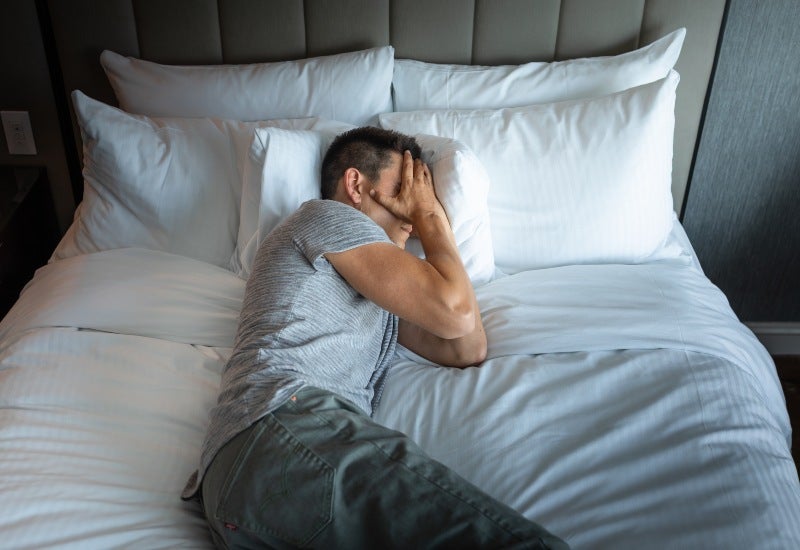Can Weight Gain Make Sleep Apnea Worse?
Quality sleep supports physical health and mental well-being. When that rest is disrupted, your quality of life declines quickly. Sleep apnea is one of the most common sleep disorders, and many people wonder how it relates to weight. Can being overweight cause sleep apnea? Conversely, can sleep apnea cause weight gain? And most importantly, what treatments are available for sleep apnea? Uncover the connection between body weight and this sleep disorder to help you make informed decisions about your health.

What Is Sleep Apnea, and What Causes It?
Sleep apnea is a disorder in which breathing repeatedly stops and starts during sleep. These pauses often last for several seconds and can occur dozens or even hundreds of times per night. This prevents the body from getting enough oxygen, which impacts physical health and daily energy levels.
There are three main types of sleep apnea:
- Obstructive sleep apnea (OSA) is the most common form, caused by relaxed throat muscles that physically block the airway.
- Central sleep apnea (CSA) is a rarer form of this condition. It occurs when the brain fails to signal the muscles that control breathing.
- Complex sleep apnea is a combination of OSA and CSA.
What Are the Symptoms of Sleep Apnea?
Recognizing the symptoms is the first step toward diagnosing and treating sleep apnea. Here’s what to watch out for in yourself or your partner:
- Loud, persistent snoring
- Gasping or choking sounds during sleep
- Waking frequently throughout the night
- Dry mouth, sore throat, or headaches in the morning
- Daytime fatigue or difficulty concentrating
- Irritability or changes in mood
If left untreated, sleep apnea increases the risk of high blood pressure, weight gain, heart disease, stroke, and type 2 diabetes.
How Does Body Weight Impact Sleep Apnea Risk?
Weight gain often worsens or triggers the onset of obstructive sleep apnea. Extra body fat around the neck narrows the airway, which increases the likelihood of collapse during sleep. As a result, people with a larger neck circumference are at greater risk of obstructive sleep apnea. Fat tissue in the midsection also reduces lung volume, making it harder for the body to maintain stable breathing at night.
Studies show that excess body weight is one of several risk factors associated with obstructive sleep apnea, along with age, gender, and anatomical structure. However, it’s worth noting that not every person with sleep apnea is overweight.
Does Gaining Weight Make Sleep Apnea Symptoms Worse?
Yes, weight gain often leads to more severe symptoms in people who already have sleep apnea. Snoring may become louder, daytime drowsiness may intensify, and nighttime breathing interruptions may become more frequent.
Many patients also wonder: Can sleep apnea cause weight gain, too? The answer is yes. Poor-quality sleep disrupts the hormones that regulate appetite, often causing increased hunger and cravings for high-calorie foods. This creates a cycle where sleep apnea and weight gain feed into each other.
Can Treating Sleep Apnea Help with Weight Management?
Many patients wonder if sleep apnea treatment can also help with weight loss. Improved sleep quality may support better energy and metabolism, but weight management still depends on a broader plan involving nutrition, exercise, and medical guidance. Consult your healthcare provider for a comprehensive plan.
What Sleep Apnea Treatments Are Available?
Treatment comes in several forms, and consulting an experienced provider is the best way to explore your options. These may include:
- Lifestyle changes: Losing weight, adjusting sleep positions, or limiting alcohol before bed may all help with airflow while sleeping.
- Continuous positive airway pressure (CPAP) therapy: CPAP therapy is a commonly recommended first-line treatment for obstructive sleep apnea, based on clinical guidelines. It delivers a controlled airstream through a mask covering the nose and mouth to help keep the airway open.
- Oral appliances: Custom-made oral devices reposition the jaw to prevent airway collapse.
- Surgery: Tissue removal, jaw repositioning, or implants may be recommended in severe cases where other treatments have not worked.
- Inspire therapy: Inspire therapy is FDA-approved for certain adults with moderate to severe OSA who are unable to tolerate CPAP. It may be suitable for adults with moderate to severe OSA who have a body mass index (BMI) below 40. An ENT specialist can evaluate if you are a candidate, as not all patients qualify for this option.
Take Control of Your Sleep and Health
SoCal Breathe Free Sinus & Allergy Centers is here to help you breathe free and sleep well. We use advanced diagnostic tools to accurately assess your sleep disorder and recommend a personalized treatment that fits your lifestyle. Schedule an appointment today in San Diego or Burbank to take the first step toward better rest and healthier living.
The information provided in this article is for informational and educational purposes only and does not constitute medical advice. It is not intended to diagnose, treat, cure, or prevent any disease or medical condition. Always seek the guidance of your physician or other qualified healthcare provider with any questions you may have regarding a medical condition or treatment.
Results may vary: Treatment outcomes and health experiences may differ based on individual medical history, condition severity, and response to care.
Emergency Notice: If you are experiencing a medical emergency, call 911 or seek immediate medical attention.


